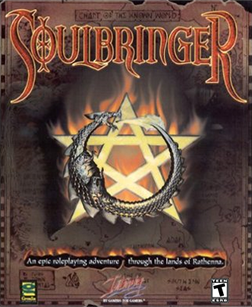Soulbringer
This article needs additional citations for verification. (December 2013) |
| Soulbringer | |
|---|---|
 | |
| Developer(s) | Gremlin Interactive |
| Publisher(s) | |
| Composer(s) | Patrick Phelan |
| Platform(s) | Windows |
| Release | |
| Genre(s) | Fantasy RPG |
| Mode(s) | Single-player |
Soulbringer is a fantasy RPG developed by Gremlin Interactive and published by Interplay Entertainment and Infogrames in 2000. It was later packed and shipped in combination with Interplay's Planescape: Torment.[2]
Plot
[edit]The game starts off with the story of a young man arriving in a town called Madrigal to find his uncle Andrus, who is the man's only remaining family member after his father died. The protagonist is soon caught in the middle of strange bandit activity around town and then drawn into escalating political and supernatural strife across the world. During the game, it is revealed that the hero is a reincarnation of a powerful being whose purpose is to defeat a group of ancient demons known as Revenants. Even though forgotten, the Revenants are secretly standing behind all major conflicts and problems encountered. The hero has to reawaken his past-life powers, travel to parallel worlds and ultimately trap the Revenants within the mystical Well of Souls.
The game includes both a good and an evil ending.
Gameplay
[edit]The game is 3D with a helicopter POV.
For the combat system, each weapon has a set of possible moves, with more powerful moves becoming available as points are put into the "combat" skill.
The game includes a novel magic system. Rather than having reflexively opposing categories of magic, Soulbringer's magic system is circular: Air suppresses earth, which suppresses spirit which suppresses water, which suppresses fire, which suppresses air. Considerable strategy is thus needed to achieve a desired balance within the elements.
Spells are obtained from spellbooks that are unlocked by runes; more powerful spells become accessible as points are put into the "magic" skill. A spell's power depends on magic skill and on strength within the elements that make up the spell.
Each move and spell requires a certain amount of time to prepare and execute (including drawing the weapon, if necessary). Motion capture was used to display such actions for added realism. Soulbringer also takes terrain and placement into account (e.g. spiders on the ground can only be hit by "low" attacks while an enemy soldier higher up on a hill can only be hit by "high" attacks).
Combinations of attacks and spells can be preset and assigned to a hot key.
Reception
[edit]| Aggregator | Score |
|---|---|
| GameRankings | 68%[3] |
| Publication | Score |
|---|---|
| AllGame | |
| CNET Gamecenter | 7/10[5] |
| Computer Games Strategy Plus | |
| Computer Gaming World | |
| Game Informer | 6.5/10[8] |
| GamePro | |
| GameRevolution | B−[10] |
| GameSpot | 6.6/10[11] |
| GameSpy | 55%[12] |
| GameZone | 7/10[13] |
| IGN | 7/10[14] |
| Next Generation | |
| PC Gamer (US) | 72%[16] |
| RPGFan | 94%[17] |
The game received "average" reviews according to the review aggregation website GameRankings.[3] Eric Bratcher of NextGen criticized the graphics, gameplay, camera and looting system, but gave positive remarks to game's combat and voice acting.[15]
The game was not a great seller for Interplay Entertainment.[citation needed]
References
[edit]- ^ Gentry, Perry (July 7, 2000). "This Week's New Releases". Gamecenter. CNET. Archived from the original on August 17, 2000. Retrieved January 20, 2022.
- ^ "Advanced Dungeons & Dragons: Planescape Torment & SoulBringer Combo Pack". GameSpy. IGN Entertainment. Retrieved February 19, 2014.
- ^ a b "Soulbringer for PC". GameRankings. CBS Interactive. Archived from the original on 1 April 2009. Retrieved 23 February 2023.
- ^ Woods, Nick. "Soulbringer - PC - Review". AllGame. All Media Network. Archived from the original on November 16, 2014. Retrieved October 25, 2020.
- ^ Harper, Kareem (August 15, 2000). "Soulbringer". Gamecenter. CNET. Archived from the original on August 21, 2000. Retrieved January 20, 2022.
- ^ Hunt, David Ryan (August 25, 2000). "Soulbringer". Computer Games Strategy Plus. Strategy Plus, Inc. Archived from the original on April 27, 2003. Retrieved October 25, 2020.
- ^ Green, Jeff (November 2000). "Soulbringer" (PDF). Computer Gaming World. No. 196. Ziff Davis. p. 168. Retrieved October 25, 2020.
- ^ "Soulbringer". Game Informer. No. 90. FuncoLand. October 2000.
- ^ Wright, Brian (August 14, 2000). "Soulbringer Review for PC on GamePro.com". GamePro. IDG Entertainment. Archived from the original on December 22, 2004. Retrieved October 25, 2020.
- ^ Ferris, Duke (September 2000). "Soulbringer Review". GameRevolution. CraveOnline. Archived from the original on September 24, 2015. Retrieved October 25, 2020.
- ^ Park, Andrew (August 4, 2000). "Soulbringer Review". GameSpot. CBS Red Ventures. Retrieved October 25, 2020.
- ^ McConnaughy, Tim (July 23, 2000). "Soulbringer". GameSpy. IGN Entertainment. Archived from the original on June 14, 2002. Retrieved October 25, 2020.
- ^ Lafferty, Michael (August 9, 2000). "Soulbringer". GameZone. Archived from the original on February 16, 2005. Retrieved October 25, 2020.
- ^ Butts, Steve (July 17, 2000). "Soulbringer". IGN. Ziff Davis. Retrieved October 25, 2020.
- ^ a b Bratcher, Eric (November 2000). "Soulbringer". NextGen. No. 71. Imagine Media. p. 142. Retrieved October 25, 2020.
- ^ "Soulbringer". PC Gamer. Vol. 7, no. 11. Imagine Media. November 2000.
- ^ Cavner, Brian (July 12, 2002). "Soulbringer". RPGFan. Emerald Shield Media LLC. Retrieved January 20, 2022.